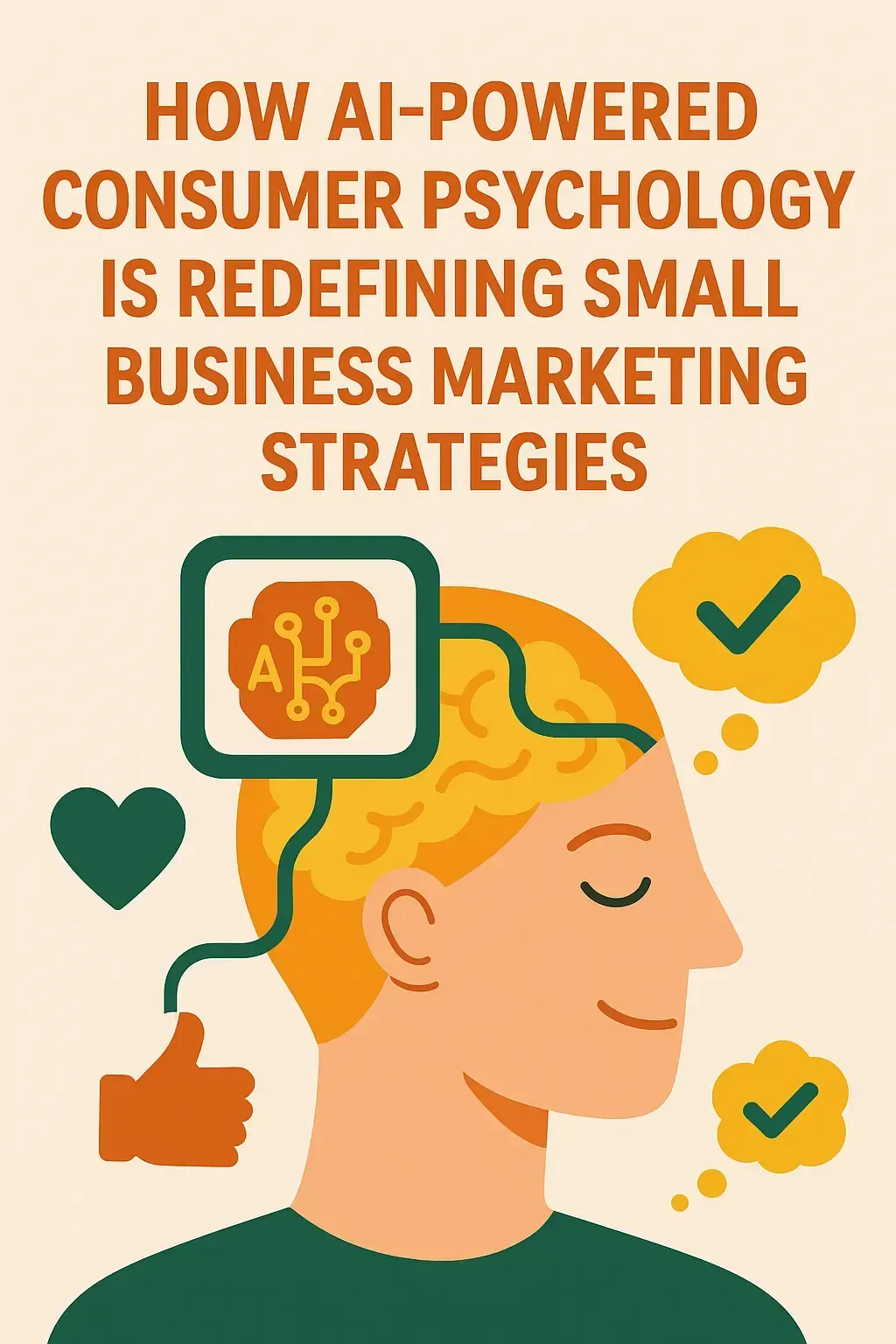
How AI-Powered Consumer Psychology is Redefining Small Business Marketing Strategies
How AI-Powered Consumer Psychology is Redefining Small Business Marketing Strategies
The world of marketing is evolving at breakneck speed, and small businesses are no longer playing catch-up. In fact, many are leading the charge by leveraging the power of AI-powered consumer psychology. This game-changing intersection of artificial intelligence and human behavior analysis is providing insights never before possible. And for small businesses, this means redefining marketing strategies with precision, personalization, and profitability.
Let’s dive into how this cutting-edge approach is transforming the small business marketing playbook and how you can harness its full potential.

Understanding the Basics: What is AI-Powered Consumer Psychology?
At its core, AI-powered consumer psychology is the application of artificial intelligence to decode human behavior. By analyzing vast amounts of data, including online behavior, shopping habits, social preferences, and even sentiment in text, AI can predict what customers want, when they want it, and how to best reach them.
Here’s where it gets exciting for small businesses—AI takes guesswork out of the equation. It provides concrete, actionable insights based on real-time consumer behavior. Companies like Amazon have been using AI-driven recommendations for years (https://aws.amazon.com/machine-learning/use-cases/personalized-recommendations/), but today, these tools are becoming accessible to businesses of all sizes.
The Shift in Small Business Marketing: From Broad to Laser-Focused
Historically, small businesses relied on intuition and broad-stroke efforts to reach their target audience. Think flyers, generic ads, and hoping to attract the right customers. But with AI-powered consumer psychology, the game changes dramatically.
Here's how this shift is playing out:
1. Hyper-Personalized Marketing
AI allows small businesses to create marketing strategies that cater to individual customers rather than targeting demographic groups. Tools like ChatGPT, Jasper, or Phrasee (https://phrasee.co/) help craft personalized email campaigns, product recommendations, and even SMS communication tailored to customer preferences. This level of personalization significantly boosts engagement and conversion rates.
2. Predictive Analytics to Stay Ahead of Trends
AI tools like Google Cloud AI (https://cloud.google.com/products/ai) analyze customer trends, helping businesses anticipate what’s next and strategize accordingly. Imagine knowing your customer needs a product before they even realize it themselves.
3. Behavioral Triggers for Real-Time Engagement
With AI-powered insights, understanding purchase triggers becomes intuitive. For instance, a bakery owner could use AI to track weather changes, customer moods, or local events and send targeted offers like "Rainy Day? Grab a Discount on Warm Pastries!"
4. Streamlined Ad Targeting
Platforms like Facebook Ads or Google Ads now use AI to help small businesses target ads with precision. By analyzing behavioral data, businesses see better ROI, as ads reach customers who are most likely to convert. Here’s an example of how Google’s AI-driven ad tools work (https://ads.google.com/home/tools/smart-campaigns/).
The Psychological Advantage: Why AI Works
The human mind is complex, but AI figures out behavioral patterns that even the sharpest marketers might miss. Here’s why AI-powered consumer psychology is so effective:
1. Emotional Intelligence
AI analyzes tone, sentiment, and emotional cues from customer interactions—whether through emails, reviews, or social media comments. Tools like MonkeyLearn (https://monkeylearn.com/sentiment-analysis/) can decode sentiment in seconds, giving businesses a psychological edge in how they respond.
2. Behavior Prediction
By studying patterns, AI anticipates customer decisions. For instance, if a consumer frequently browses hiking gear but abandons their cart, AI might suggest the perfect moment to hit them with a limited-time discount, effectively nudging them across the finish line.
Real-Life Applications for Small Businesses
If you're still wondering whether AI-powered consumer psychology is worth exploring, here are some practical ways small businesses are transforming their marketing strategies:
1. Content Creation and Optimization
Struggling to connect with your audience? AI tools like Grammarly, HubSpot AI, and Copy.ai are helping businesses craft compelling blogs, social media captions, and website content fine-tuned to resonate with their audience (https://www.granify.com/blog/growth-hacks-for-ecommerce).
2. Conversational Marketing
Chatbots like Drift and MobileMonkey (https://mobilemonkey.com/) engage with customers 24/7, answering their queries, collecting data, and even recommending products. This automation makes small businesses appear big without bloated overhead.
3. Customer Retention Strategies
Retention trumps acquisition any day. By analyzing loyalty metrics and past purchases, AI helps businesses design re-engagement campaigns that work. Shopify’s built-in AI tools are a great example of this (https://www.shopify.com/tools/predictive-analytics).
Challenges Faced by Businesses and How to Overcome Them
Every revolution has its teething problems, and AI-powered consumer psychology is no different. Small businesses may face:
- Data Overload: Too much data can overwhelm businesses without data analytics expertise. Solution? Start with simple tools like Pipedrive or Zoho Analytics (https://www.zoho.com/analytics/) that are beginner-friendly.
- Budget Constraints: A common perception is that AI is expensive, but SaaS platforms like Hootsuite and SEMrush offer affordable, scalable solutions (https://www.semrush.com/).
- Learning Curve: Adopting AI requires time and training. Many platforms provide free tutorials and courses to ease adoption. For instance, Microsoft Azure offers free hands-on AI training (https://learn.microsoft.com/en-us/training/).
Why Small Businesses Can’t Afford to Ignore This
The traditional methods of broad-based marketing are quickly becoming obsolete. AI-powered consumer psychology levels the playing field between small businesses and big brands. The ability to connect with customers emotionally and intelligently is no longer a luxury—it’s table stakes.
Brands like Driftwood Coffee or local boutique stores using AI advertising via Meta (Facebook) are proving that size doesn’t matter; strategy does.
Final Thoughts: Where Do You Start?
If you’re a small business owner wondering, “Where do I even begin?”—start small. Explore tools that align with your current processes, test them with free trials, and build as you grow. The key is to lean into AI-powered consumer psychology incrementally.
Here’s a simple action plan to kickstart your strategy today:
1. Invest in an affordable CRM with built-in AI analytics like HubSpot (https://www.hubspot.com/).
2. Use a sentiment analysis tool like MonkeyLearn to understand your audience’s emotional triggers.
3. Experiment with predictive ad tools in Google or Facebook to improve ad efficiency and ROI.
You don’t need a Fortune 500 budget to win in the AI game. What you need is to understand your customers better than anyone else—and with AI-powered consumer psychology, that’s no longer a pipe dream.
Ready to reshape your marketing strategy? The AI-powered era is here. Small businesses who embrace it will thrive. Those who don’t? The market won’t wait.
Ready to harness the power of AI?
Book a call today to learn how we can implement these strategies for your business:

